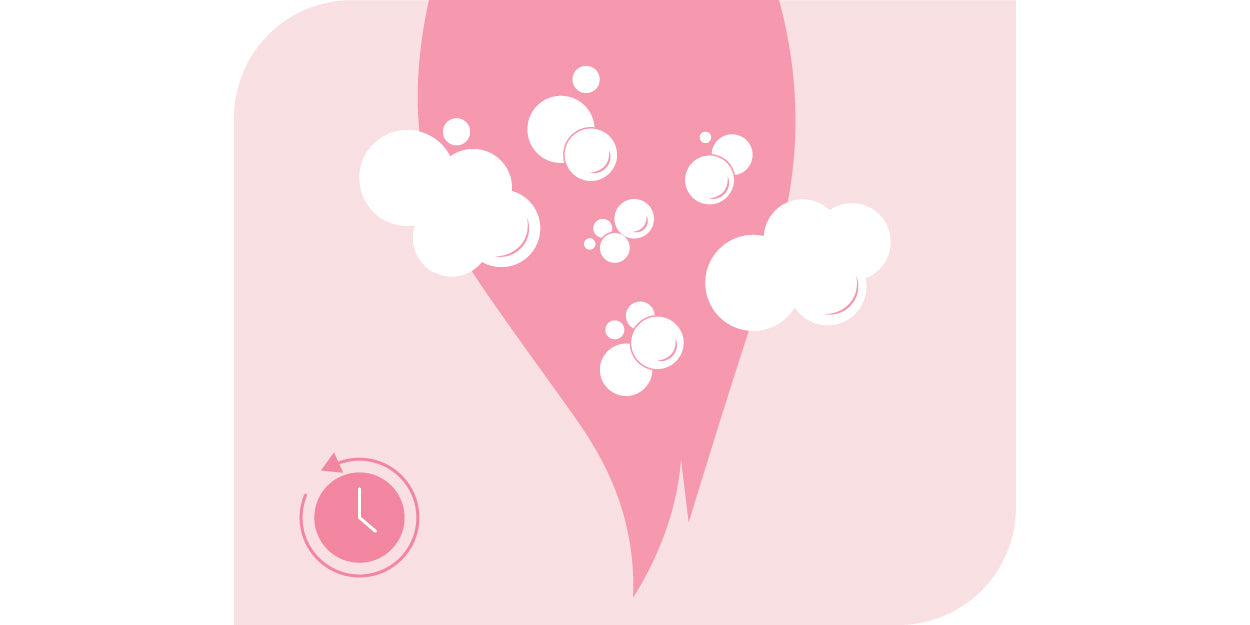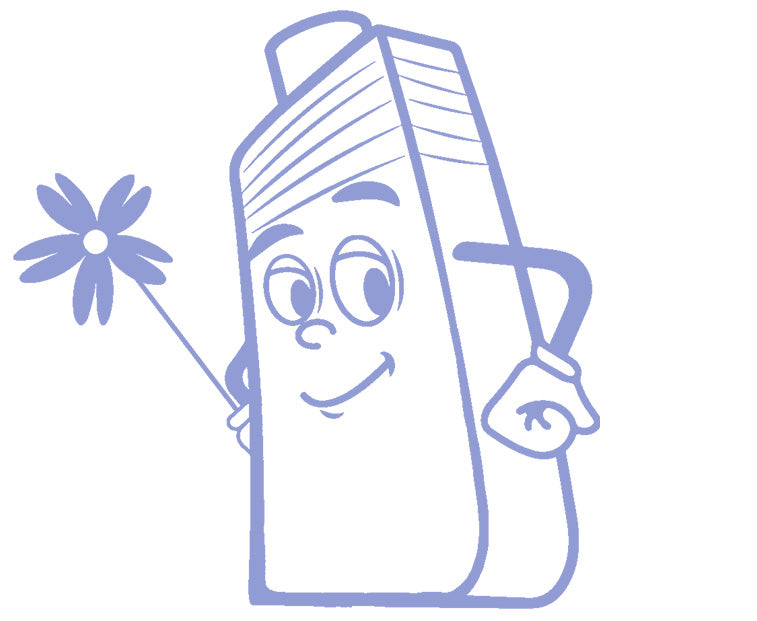Dealing with static hair often seems like a never ending struggle – especially in the dry winter months. But it doesn’t have to be! To learn more about static hair and how to stop it, keep reading!
Index
What is Static Hair?
If you recall from chemistry class, all matter is made from atoms that are composed of protons, neutrons, and electrons. Electrons have a negative charge. Sometimes, electrons escape their atoms and cling to other atoms, giving them an electric charge.
Static hair happens when your hair takes on extra electrons and thus picks up an electric charge. The charge in your hair will cause the strands to repel one another like magnets. The strands become unruly, may cling to your skin or clothes, and even stand on end!
What Causes Static Hair?
So, what causes static electricity in hair? How does your hair pick up extra electrons?
Static hair is caused by friction between your hair and another object. This could be your hairbrush, your winter coat, a scarf, etc. The friction between the other object in your hair causes electrons to rub off on your hair, leaving it with an electric charge.
If the air is humid, this static charge will usually just go away. But if your hair or the air is dry (or both), then you’ll notice more signs of static electricity in your hair.
Static hair is made much worse by dry conditions. That’s why static electricity in hair is worse in the winter. Cold temperatures outside and dry, hot air inside result in arid conditions that cause plenty of static. And if your hair is dry or damaged, you’ll experience even more static electricity in your hair.
What’s the Difference Between Static Hair & Frizz?

While they may look the same – unruly, unmanageable strands – static hair and frizz are a bit different. Frizz happens when dry, damaged locks soak up humidity in the air, causing the hair to bend and curl. Static, on the other hand, happens to dry, damaged hair when the humidity is low. That’s why you tend to experience frizz in the summer (when the weather is humid), while static hair is more common in the winter (when the weather is dry).
The good news? By learning how to stop static hair in the winter months, you’ll also learn how to reduce frizz during the summer months.
9 Ways to Stop Static Hair
As I mentioned before, dry conditions make static hair much, much worse. So any hair care routine designed to stop static hair must work by imbuing hair with lightweight moisture. The best defense is a good offence, so defend your hair against static electricity by following these simple anti-static hair care tips.
1. Start with a Moisturizing Shampoo

The first step in fighting static electricity in hair is swapping out your regular shampoo with a shampoo for dry hair. My favorite is Moisture Hero™ Shampoo, which uses natural ingredients to cleanse and hydrate hair in need of a little extra TLC.
Hint: If you have curly or blonde hair try instead these shampoos targeted for the specific needs of these hair types.
2. Change Your Washing Routine

If you’re shampooing your hair every day, consider cutting down on wash days. Shampooing your hair too often can leave it dry and more prone to static electricity. To stop static hair, wash your hair no more than two to three times per week. My secret is using Refresh Powder™ Dry Shampoo in between wash days.
Also, make sure that you wash your hair with lukewarm water and never hot water. Hot showers may feel amazing, but hot water can dry out your hair and leave it more prone to static electricity.
3. Hydrate with Conditioner

Repeat after me: always follow shampoo with a high-quality conditioner. Conditioners replenish your hair with hydration and help to prevent static electricity in hair.
Of course, not all hair conditioners are created equal. If you have fragile, dry, or damaged hair, you’ll need a moisturizing conditioner that imbues your hair with lightweight hydration and nourishment.
Enter Moisture Hero™ Conditioner. This deep moisturizing conditioner hydrates dry and frizzy hair, while strengthening the cuticle to fight moisture loss. Plus, it’s formulated without silicones, so it won’t leave a heavy residue on your hair.
When applying conditioner, make sure to apply it to your lengths only. This will make sure the hydration reaches where you need it most.
4. Use a Deep-Conditioning Treatment

On top of conditioning each and every time you wash your hair, you’ll also want to apply a deep conditioning treatment at least once per month.
I suggest using Moisture Hero™ Pre-Shampoo Balm. This product is interesting because, unlike other deep conditioning masks that you apply to damp hair, you use this one before you wash your hair. Why? Because dry hair is better able to absorb ultra-nourishing ingredients like shea butter, jojoba butter, and sunflower seed oil. For extra dry and damaged hair, apply this balm to the hair before bed to allow the ingredients to work their magic all night long.
5. Choose Your Tools Wisely

Metal combs and brushes can also be a no-no for static hair. Instead, look for brushes and combs made out of natural materials like boar bristles, wood or bamboo.
Better yet, skip the brush altogether. If you have a lot of static electricity in your hair, the extra friction from brushing your hair will just make things worse. Instead, use a wide-toothed comb. If you absolutely must brush your hair, then spritz your brush with an anti-static spray for hair.
6. Apply an Anti-Static Spray for Hair

During particularly dry weather (like in the winter), you may need to boost your hydration during the day by using an anti-static leave-in conditioner for hair. I recommend packing Split Fix™ Leave-in Conditioner in your bag to tame any static flare-ups and provide additional nourishment throughout the day. When you notice static electricity in your hair, just give it a fine mist of this anti-static spray for hair and watch the electricity disappear!
7. Opt for Natural Fibers

Have you ever noticed that the fabrics that cause the most static electricity in the hair are made from synthetic fibres? You may love the look of your satin pillowcase, but synthetic fabrics like satin can cause more static electricity in hair.
Instead, opt for pillowcases and towels made out of natural fibres like cotton, silk or bamboo. These natural fabrics don’t hold electric charges as well as synthetic fabrics do, which means less static electricity in your hair.
For example, I recommend swapping out your pillowcase and duvet cover for Silky Bamboo Pillowcase and Silky Bamboo Duvet Cover. This bamboo has smooth fibres that prevent both static hair and tangles. Or try Bamboo Hair Towel Wrap, which helps to dry hair quickly without frizz or static.
8. Be Careful with Heat

Styling your hair with heat can also dry out your locks and increase static electricity. Whenever possible, opt for heat-free hairstyles. If you do choose to style your hair with heat, always protect your hair beforehand with a high-quality heat protectant. My favorite is Thermal Shield™ Heat Protectant that has a silicone-free formula based on DayMoist CLR™, organic aloe vera, oat kernel extract, glycerin, and ultra-moisturizing sugar complex Aquaxyl™.
9. Stay Away from Drying Ingredients

Believe it or not, certain hair products contain ingredients that can dry out your hair, leaving it more prone to static. Sulfates are one of the biggest offenders, and they’re particularly drying for curly hair types. If you have dry or curly hair, watch out for this ingredient.
Quick Fixes: 8 Products to Stop Static Hair
All of the above tips will help to stop static hair over time, but what if you need to stop static electricity in hair right now?
Final Touch Hair Spray
Many hairsprays dry out hair and leave it more prone to static electricity in hair, but not this one! Final Touch Hair Spray has a unique hydrating formula featuring organic aloe leaf juice, açai berry extract, and glycerin, which means that it also acts as an anti-static spray for hair. Use Final Touch Hair Spray on wet hair for a frizz-free blowout, or on dry hair to lock styles in place and stop static hair.
Final Touch Hair Styling Stick
Smooth away flyaways and frizz and stop static hair with this hair-perfecting product. Final Touch Hair Styling Stick has a formula rich in plant-based antioxidants that lends medium hold and lightweight shine to hair in need of a little smoothing. This travel-size hair product is perfect for slipping into your bag to have a weapon against static hair anywhere!
Split Fix™ Hair Oil
Damaged hair is of course more prone to static electricity, which is why this ultra-nourishing hair oil is super helpful for stopping static hair. Split Fix™ Hair Oil is formulated with a unique blend of lightweight-yet-nourishing oils that work together to moisturize hair without weighing it down. It also gives your hair a beautiful sheen. (If you’re never tried a hair oil before, make sure to read this post on how to use hair oil.)
Split Fix™ Leave-in Conditioner
If you're looking for a more lightweight solution instead of a hair oil, opt for a silicone-free leave-in conditioner. With a boost of hydration, nutrients, and antioxidants, this lightweight spray leaves hair smooth, soft, and healthier-looking. It instantly tackles static hair and improves manageability for easy styling.
Moisture Hero™ Hair Oil
For very dry, curly or coarse hair prone to static flyaways, try this silicone-free, 100% naturally derived hair oil that contains six nutrient-rich oils that penetrate and hydrate your strands with plenty of moisture.
Sun Defense Hair Mist
This leave-in treatment acts as an anti-static spray for hair and adds an extra boost of hydration and shine to hair that’s dry, damaged, or frizzy, AKA the type of hair that’s most prone to static electricity. Plus, it protects against sun damage! Use this anti-static spray for hair as part of your styling routine, or keep it in your bag to eliminate static on the go.
Use a Dryer Sheet
It may sound silly, but using a dryer sheet is a great way to eliminate static in a pinch. Dryer sheets contain ingredients that eliminate excess electrons in your hair. Keep one in your purse for static emergencies. But be careful if you have sensitive skin because some dryer sheets contain fragrances that can be irritating.
Try Hand Moisturizer
If you get caught in a static-y situation without a dryer sheet or an anti-static spray for hair, you can also use a small amount of hand cream (emphasis on the small amount!). The same hydrating ingredients that moisturize your skin will also moisturize your parched strands and stop static electricity in its tracks. Just be careful not to use too much, or you wind up with greasy-looking locks.
To stop static hair, change your hair care routine to prioritise hydration and make sure to add an anti-static spray for hair to your lineup. By following these tips, you’ll drastically reduce static electricity in your hair. Do you have any tips for stopping static hair?






















































































